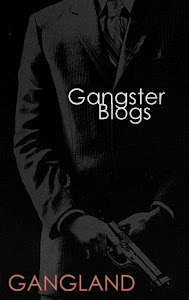

Ruben "Nite Owl" Castro, 46, a leader of the Mexican Mafia prison gang who authorities said controlled the two cliques of the 18th Street gang targeted in the indictment, the Shatto Park Locos and the Hoover Locos.
Castro allegedly ran the enterprise from the Administrative Maximum facility in Florence, Colo., where he is serving a life term after being convicted on similar gang racketeering charges in 1997.
With the highest level of security in the nation, the Supermax houses Unabomber Theodore Kaczynski, shoe-bomber Richard Reid and 9/11 plotter Zacarias Moussaoui.
Under constant surveillance, Castro had to use cryptic phone conversations and hidden messages to get his directives to his deputies on the streets, who are described in court papers as "shot callers."
At least two letters seized by the FBI were scrawled in thick pencil marks, which when erased revealed tiny messages written with a fine-point pen.
"We have a couple letters with significant messages to the shot callers on how to direct things," Riordan said.
Castro mostly relayed his messages through his girlfriend, Jesusita Ramirez, 62, who served as an intermediary between him and the street lieutenants, prosecutors said.
Letters from prisoners are supposed to be screened by prison officials. But Castro's hidden messages apparently were able to get out of the prison undetected, officials said.
From the same prison, members of the Aryan Nation gang were able to send orders for killings and other crimes using a complicated system of secret codes, according to testimony at a trial in Orange County earlier this year.
Running Castro's day-to-day operation outside the prison were the shot callers who collected regular "rent" from drug wholesalers and street peddlers, prosecutors allege.
One wholesaler allegedly said that he paid defendant Mervin Nelson Sanchez $1,500 a week to supply dealers in one area.
"Untimely payment of rent to Ruben Castro Organization by a narcotics dealer often resulted in increased rent," according to the indictment, followed by "threatened and actual acts of violence."
Shot callers decided whether the wholesalers and retailers were bringing in enough cash, Riordan said. They told the dealers which wholesalers they had to buy from, and how much per day they had to buy.
When unauthorized dealers moved in, the shot callers gathered weapons to get rid of them, the indictment alleges.
The shot callers didn't have free reign, though, he said; they answered to Castro's girlfriend, Ramirez, who is wanted but still at large.
On one occasion in 2004, according to court documents, she told a shot caller that Castro was angry because drug sales in one neighborhood were down. Castro, she said, believed that the reason was because the shot caller's assistant lived too far from the area, according to court documents.
Much of the estimated half-million dollars a year in proceeds was transferred straight to her, the indictment says, and a small amount went to Castro in prison. Another portion allegedly went to the Mexican Mafia to pay for protection for members of the two 18th Street gang cliques in prison.
Local and federal authorities have been trying for decades to bring down the 18th Street gang, which has about 8,000 members in Los Angeles County alone.
In 2000, federal prosecutors indicted 26 members of the 18th Street clique known as the Columbia Li'l Cycos, which also charged dealers the right to operate.
The group generated hundreds of thousands of dollars in profits, which it plowed into homes in Burbank and El Monte, a restaurant in South Gate and an auto business in Los Angeles. The case resulted in 26 convictions, Riordan said.
The Los Angeles city attorney's office has obtained three different injunctions against the gang's various cliques. Castro was arrested in 1997 along with other gang leaders in what officials said then was an effort to "cut off the head" of the gang.
But the 18th Street gang has seemed to bounce back each time, often with new recruits.
Based on experience, Riordan said, he expects the latest indictment to put the gang out of action for three years in those neighborhoods. But, he said, other members might eventually fight for control of the area.
In addition to Castro, 10 members and associates of the 18th Street gang were indicted on federal racketeering and conspiracy charges of using threats and violence to control the drug trade.
Both the 18th Street gang and its rival, the Mara Salvatrucha, were born among Central American immigrants in the troubled blocks of apartments west of downtown, and have since grown to tens of thousands of members here, in Central America and, increasingly, across the United States and Mexico.
The U.S. Southern Command, based in Miami, has said the gangs pose one of the biggest threats to security in Central America, and authorities are concerned that the acts of extreme violence seen there — beheadings, tortures, a massacre of 28 people on a bus in Honduras — could begin here.
Though the two gangs mostly are disorganized — with no known leadership — there are signs that they are evolving into something more organized. "In El Salvador, eight different cliques got together and performed a kidnapping extortion recently," the FBI's Robert B. Loosle said.
The indictment is the first time that federal authorities have alleged a conspiracy between two cliques.
Riordan said this type of organization and professionalism generally starts in Los Angeles and spreads.
"We are the cradle," he said.














0 comments:
Post a Comment